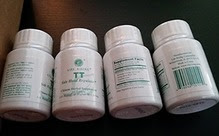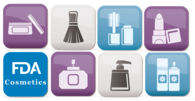


Ton Shen Health Recalls Life Rising Brand “Side Head Regulator TT Tablet” Because of Possible Health Risk for Children Under the Age of 18Ton Shen Health of Chicago, IL, is recalling its Life Rising brand “Side Head Regulator TT” Tablets because they have tested positive for elevated levels of lead for children under the age of 18. Lead is a naturally occurring element which can affect multiple body systems and is particularly harmful to young children. Recent lab tests indicate certain lots of TT product have elevated levels of lead above the currently recognized acceptable levels for children. Lead poisoning can happen if a person is exposed to high levels of lead over short periods of time. Due to the test results affecting children and to the possibility of use by children, Ton Shen Health is recalling the TT product.
The recalled Life Rising brand "Side Head Regulator TT" tablets were mostly sold locally in Chicago area retail stores and some were distributed to other states through mail orders. More information
|
Love My Tru Body Issues Voluntary Nationwide Recall of Skinny Bee Diet Due To Presence of Undeclared Sibutramine, Desmethylsibutramine and/PhenolphthaleinMcDonough, Georgia, Love My Tru Body McDonough, GA is voluntarily recalling all of Skinny Bee Diet 500 mg MFD: 03.07.2106 EXP: 03.06.2018 distributed March 23 - April 28, 2016 to the consumer level after FDA laboratory testing found Skinny Bee Diet to contain sibutramine, desmethylsibutramine, and/phenolphthalein.
Sibutramine is an appetite suppressant that was withdrawn from the U.S. market in October 2010. Desmethylsibutramine is an active metabolite of sibutramine. Sibutramine and its active metabolites substantially increase blood pressure and/or pulse rate in some patients and may present a significant risk for patients with a history of coronary artery disease, congestive heart failure, arrhythmias or stroke. More information
|
|

Over-The-Counter (OTC) Heartburn TreatmentWhat is Heartburn?
Heartburn occurs when stomach contents flow back up into the esophagus—the muscular tube that carries food and liquids from the mouth to the stomach. Also called acid indigestion, heartburn is an uncomfortable, burning feeling in the mid-chest, behind the breastbone, or in the upper part of the abdomen—the area between the chest and the hips. This feeling occurs because the stomach’s digestive juices contain acid. Sometimes people with this problem can taste food or acidic fluid in the back of the mouth. More information |
Know Your Source: Protecting Patients from Unsafe DrugsBeware of Rogue Wholesale Drug Distributors
Wholesale drug distributors are a link between manufacturers and health care professionals. Their role is to ensure prescription medications are delivered safely and efficiently to thousands of health care practitioners and pharmacies nationwide every day.
While the U.S. health care supply chain is one of the most secure and sophisticated in the world, there is a growing network of rogue wholesale drug distributors selling potentially unsafe drugs in the U.S. market. More information
|
|
Comunicaciones de la FDA sobre la seguridad de los medicamentos en español
Descargo de responsabilidad: La FDA reconoce la necesidad de proporcionar información importante sobre seguridad de los medicamentos en idiomas distintos al inglés. Hacemos lo mejor posible para proporcionar versiones en español precisas y oportunas de nuestras Comunicaciones de Seguridad de Medicamentos. Sin embargo, en caso que existiera discrepancias entre las versiones en inglés y la de español, la información contenida en la versión en inglés es la que se considera como versión oficial. Si tiene alguna pregunta, por favor contáctese con Division of Drug Information en druginfo@fda.hhs.gov.Comunicaciones de la FDA |


FDA knows the major public health consequences that can result from drug shortages. These shortages occur for many reasons including manufacturing and quality problems, delays and discontinuations. When issues are discovered, FDA works closely with the company to address risks involved to prevent harm to patients. FDA also considers the impact a shortage would have on patient care and access and works with the company to restore supplies while also ensuring safety for patients. More information
|
Drug Discontinuation Voluntarily Reported by Manufacturers During the Past 2 Weeks:
Information about blood and biologic shortages, resolved shortages, and discontinuations
La FDA reconoce las consecuencias significativas para la salud pública que pueden resultar de la escasez de medicamentos y hace un gran esfuerzo dentro de sus facultades legales para abordar yprevenir la escasez de medicamentos. La escasez se produce por muchas razones, incluyendo problemas de fabricación y calidad, retrasos y discontinuación del producto. Cuando los problemas son descubiertos por la empresa o el público y reportados a la FDA o se descubren por inspecciones de la FDA, la FDA trabaja en estrecha colaboración con la empresa para hacer frente a los riesgosinvolucrados y evitar daños a los pacientes. La FDA también considera el impacto que una escaseztendría en la atención médica del paciente y al acceso del producto y trabaja con la empresa pararestablecer el suministro al tiempo que garantiza la seguridad de los pacientes. Más información
|

FDA approves new device for prevention of recurrent strokes in certain patientsThe FDA approved the Amplatzer PFO Occluder device. The PFO Occluder reduces the risk of a stroke in patients who previously had a stroke believed to be caused by a blood clot that passed through a small hole in the heart, called a patent foramen ovale (PFO), and then traveled to the brain.
“The Amplatzer PFO Occluder provides a non-surgical method for doctors to close a PFO,” said Bram Zuckerman, M.D., director of the Division of Cardiovascular Devices in the FDA’s Center for Devices and Radiological Health. “But as the device labeling clearly states, patients need to be evaluated carefully by a neurologist and cardiologist to rule out other known causes of stroke and help ensure that PFO closure with the device is likely to assist in reducing the risk of a recurrent stroke. More information
|
For information on drug approvals or to view prescribing information and patient information, please visit Drugs@FDA or DailyMed.

View FDA's Comments on Current Draft Guidance page, for a list of current draft guidances and other topics of interest for patients and caregivers.
|


The Race to bring Penicillin to the Troops in WWII, by: John P. Swann, Ph.D., FDA HistorianThis Veterans Day we remember that nearly 75 years ago dozens of American academic, commercial, nonprofit, and governmental institutions – including FDA – joined together in a race to provide a promising but complex and unstable medicine to troops fighting in World War II — penicillin. Knowing that infection is the major killer in wars, not battle injuries, their goal was to help turn a British discovery into a crucial wartime medical contribution and what would become an indispensable therapeutic agent long after that conflict ended.
Many people are familiar with the story of Alexander Fleming’s 1928 discovery of a Penicillium mold that had contaminated — and surprisingly destroyed — his cultures of pathogenic organisms.
To read the rest of this post, see the FDA Voice Blog, November 7, 2016 |
Key Facts about “Abuse-Deterrent” Opioids, by: Douglas C. Throckmorton, M.D., Deputy Center Director for Regulatory Programs in FDA’s Center for Drug Evaluation and Research
Here at FDA, we work diligently to be part of our nation’s solution to the opioid abuse epidemic. While there is no single solution to this complex problem, we continue to encourage efforts to develop new opioid formulations with abuse-deterrent properties that make it harder to abuse these powerful medications are used as safely as possible. Knowing there are some 100 million Americans with significant pain each year, we need to help ensure that patients in need continue to have appropriate access to pain medications, including opioids. At the same time we must work to ensure that these powerful medications are used as safely as possible. To read the rest of this post, see the FDA Voice Blog October 28, 2016 |
|

In this section you will find a comprehensive list of all the meetings that the FDA is involved with. The meetings may include advisory committee meetings, public workshops and public conferences that are seeking to hear from patients and caregivers.
Most FDA meetings are free to the public and do not require the public to register. Interested persons may present data, information, or views, orally at the meeting, or in writing, on issues pending before the committee. Other types of meetings listed may require prior registration and fees.
|
View FDA's Patient Network Calendar of Public Meetings page for a complete list of meetings and workshops.
For additional information on other agency meetings please visit Meetings, Conferences, & Workshops.
|

How to Treat Impetigo and Control This Common Skin Infection
It’s a scary sight when your child comes home from day care or elementary school with red sores and oozing fluid-filled blisters. Don’t be alarmed if it’s impetigo. Impetigo — one of the most common childhood diseases — can be treated with medications approved by the FDA.
Impetigo is a common bacterial skin infection that can produce blisters or sores anywhere on the body, but usually on the face (around the nose and mouth), neck, hands, and diaper area. It’s contagious, preventable, and manageable with antibiotics, says pediatrician Thomas D. Smith, MD, of FDA. More information
|

Depression: FDA-Approved Medications May Help
Depression is a serious medical illness. Also called “major depressive disorder,” or “unipolar depression,” it affects about 350 million people worldwide and is a leading cause of disability, according to the World Health Organization.
If you have depression, you may not recognize the symptoms or may think symptoms are due to a lack of sleep or a poor diet. Or you may realize you’re depressed but feel too tired or ashamed to seek help.
Not all depression requires treatment with medication. But medications approved for the treatment of depression by the FDA (referred to here as “antidepressants”) can help improve symptoms in some people. More information
|

How FDA Helps You Make Healthy Food ChoicesAs you’re sitting around your kitchen table or walking into your favorite chain restaurant, or in the grocery store, you may wonder:
What should I feed myself and my family at home? What about when we’re eating out? Which of the many food options available would be a healthy choice, no matter where we’re eating?
To help you make healthy choices, FDA’s recent efforts will do two things: First, provide the information you need to make those choices.
Second, encourage and help food companies to reformulate, or change the recipes of products to produce healthier foods. More information |
More Consumer Updates
For previously published Consumer Update articles that are timely and easy-to-read and cover all FDA activities and regulated products. More information
For previously published Consumer Update articles that are timely and easy-to-read and cover all FDA activities and regulated products. More information
En Español
La información en esta página es para el público en general, y para profesionales y educadores de salud. Esta información puede ser distribuida y publicada sin previa autorización. En Español
La información en esta página es para el público en general, y para profesionales y educadores de salud. Esta información puede ser distribuida y publicada sin previa autorización. En Español

Food Safety for People with Diabetes
Food safety is important for everyone – but it’s especially important for you. That’s why the U.S. Department of Agriculture’s Food Safety and Inspection Service and the U.S. Department of Health and Human Services’ Food and Drug Administration have prepared this booklet. It is designed to provide practical guidance on how to reduce your risk of foodborne illness. In addition to this guide, we encourage you to check with your physician or health care provider to identify foods and other products that you should avoid. You have a special need for this important information . . . so read on! More information |

The Safety Reporting Portal
The Safety Reporting Portal (SRP) streamlines the process of reporting product issues to the Food and Drug Administration and the National Institutes of Health. Whatever your role, (manufacturer, health care professional, researcher, public health official, or concerned citizen), when you submit a safety report through this Portal, you make a vital contribution to the safety of America's food supply, medicines, and other products that touch us all. More information
Center for Food Safety and Applied Nutrition
The Center for Food Safety and Applied Nutrition, known as CFSAN, carries out the mission of FDA. The Center provides services to consumers, domestic and foreign industry and other outside groups regarding field programs; agency administrative tasks; scientific analysis and support; and policy, planning and handling of critical issues related to food and cosmetics. More information
Food Facts for You
The Center for Food Safety and Applied Nutrition, known as CFSAN, issues food facts for consumers to keep you and your family safe. More information |

Animal Health LiteracyAnimal Health Literacy means timely information for the benefit of all animals and their humans. With continuous communication and outreach, the Center for Veterinary Medicine (CVM) strives to enhance the public trust, promote safe and effective use of the animal health products we regulate, and share our scientific endeavors. CVM provides reliable, science-based information to promote animal and human health. More information and Publicaciones en Español del FDA
Animal and Veterinary UpdatesAnimal and veterinary updates provide information to keep your pets healthy and safe. More information
|

How to Report a Pet Food Complaint
You can report complaints about a pet food product electronically through the Safety Reporting Portal or you can call your state’s FDA Consumer Complaint Coordinators. Please provide as much information as possible in your complaint, such as exact name of product, type of container, lot number, UPC codes, how the food was stored, and purchase date and exact location where purchased. If possible, please save the original packaging until the pet food has been consumed. The packaging contains IMPORTANT information often needed to identify the variety of pet food, the manufacturing plant, and the production date. More information |
 |
Missed the inaugural issue of CTPConnect?
FDA’s Center for Tobacco Products (CTP) recently published its newest issue of CTPConnect, a plainspoken digest with the latest stories from the Center. Want the full experience? Sign up today to receive the next issue of CTPConnect and other important updates from CTP directly to your inbox. |

Center for Tobacco Products updated safety reporting portal
CTP recently updated its Safety Reporting Portal, an online tool for reporting suspected problems with tobacco products. Whether you’re a consumer, manufacturer, clinical investigator, or health professional, let FDA know about products that seem to be damaged, defective, contaminated, or that smell or taste wrong. More information and to report a safety concern online. |
FDA’s LGBT Public Education Campaign Makes Headlines
FDA’s “This Free Life” Campaign was recently recognized at the annual Association of National Advertisers (ANA) Multicultural Marketing & Diversity Conference. Winning the Multicultural Award of Excellence in the LGBT category, FDA made its mark among other category winners such as Coca-Cola, Toyota, and McDonalds. Watch the Ad and learn more about FDA’s “This Free Life” campaign!
FDA’s “This Free Life” Campaign was recently recognized at the annual Association of National Advertisers (ANA) Multicultural Marketing & Diversity Conference. Winning the Multicultural Award of Excellence in the LGBT category, FDA made its mark among other category winners such as Coca-Cola, Toyota, and McDonalds. Watch the Ad and learn more about FDA’s “This Free Life” campaign!

Share the image and support those who matter to you most!
Do you know someone who could benefit from CTP’s messages about tobacco? Sharing information about the health effects of tobacco has never been so easy. Simply save either image in this section and post it to your social media account, such as Facebook or Twitter. |

Bad reaction to a cosmetic? FDA needs to know
What do you do if you have a reaction after using a cosmetic product? First, stop using the product and contact your healthcare provider. Next, please report it to FDA.
Here’s why that next step is so important: Cosmetic products aren’t required by law to have FDA approval before they go on the market. Companies that market cosmetics have a legal responsibility to ensure product safety, but FDA can only take action if the product is shown to be unsafe after the product is on the market.
And, because the law doesn’t require cosmetic companies to share customer complaints or other safety information with FDA, voluntary reports from consumers and healthcare providers are one of the best ways for FDA to learn about any problems.
Cosmetics include a range of products people use every day, such as moisturizers, makeup, shampoos and conditioners, face and body washes, deodorants, nail care products, hair dyes and relaxers, and tattoos. More information
|
Recalls and Alerts
To see safety alerts and recent recalls related to cosmetics and other products regulated by FDA. More information
To see safety alerts and recent recalls related to cosmetics and other products regulated by FDA. More information
What to watch for, how to report
You can report an allergic reaction, a rash, redness, burn, hair loss, headache, infection, illness, or any other unexpected reaction, whether or not it required medical treatment. You can also report a bad smell, color change, or other sign of contamination. You can choose the way you’d prefer to report:
You can report an allergic reaction, a rash, redness, burn, hair loss, headache, infection, illness, or any other unexpected reaction, whether or not it required medical treatment. You can also report a bad smell, color change, or other sign of contamination. You can choose the way you’d prefer to report:
- Call an FDA Consumer Complaint Coordinator if you want to speak directly to a person about your problem.
- Complete an electronic Voluntary MedWatch form online.
- Complete a paper Voluntary MedWatch form that you can mail to FDA.

Information about Expanded Access
Expanded access, sometimes called "compassionate use," is the use outside of a clinical trial of an investigational medical product (i.e., one that has not been approved by FDA). FDA is committed to increasing awareness of and knowledge about its expanded access programs and the procedures for obtaining access to human investigational drugs (including biologics) and medical devices. More information |
Learn about what your physician should do before submitting a request for individual patient expanded access use of an investigational medical product, who may be eligible for expanded access, associated costs, FDA contacts and more. Information for Patients
|
Learn about your responsibilities under the expanded access pathway, how to submit a request for expanded access for an individual patient (including for emergency use), which forms to use, FDA contacts and more. Information for Physicians
|

FDA Patient Network
The FDA Patient Network contains a series of webpages, webinars and presentations on topics related to patient engagement, FDA regulations, understanding medical product (Drugs, Biologics, and Devices) approval and medical product safety updates, Take me to the FDA Patient Network or take me to FDA Webinars.
FDA Basics
Each month, different centers and offices at FDA will host an online session where the public can ask questions to senior FDA officials about a specific topic or just listen in to learn more about FDA. More information
Educational Videos
|

healthfinder.gov
Welcome to healthfinder.gov, a government Web site where you will find information and tools to help you and those you care about stay healthy. More information /más información
FDA Email Updates
Sign up for one of the FDA disease specific e-mail list that delivers updates, including product approvals, safety warnings, notices of upcoming meetings, and notices on proposed regulatory guidances.  |
























.png)












No hay comentarios:
Publicar un comentario